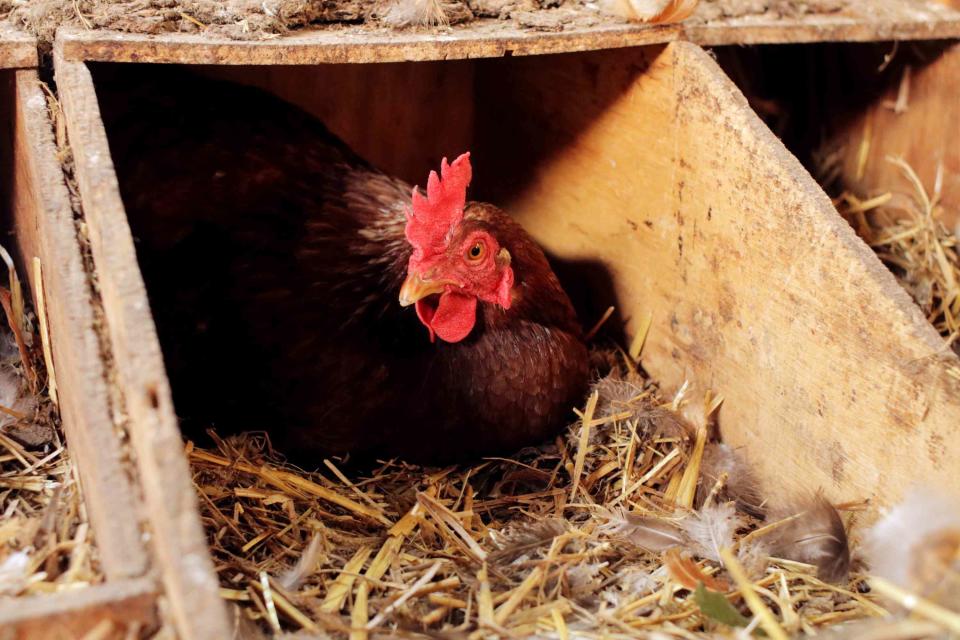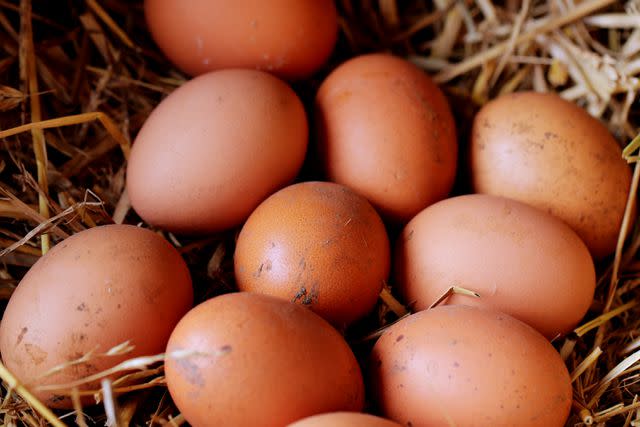Tips for Handling a Broody Hen
And How to “Break” a Broody Hen

The Spruce / Steven Merkel
Reviewed by Amanda Rose Newton
A hen's eggs may be fertilized or unfertilized when you keep chickens. A broody hen is a term given to a dedicated mother bird that has begun to sit on and incubate the eggs day and night, leaving only once daily to eat, drink, and poop. She may hiss and peck at you if you remove the hen from her eggs. A broody hen is excellent if you want to breed chicks but not helpful if you are keeping chickens to produce eggs to eat or sell.
A broody hen is a chicken that has decided to incubate a clutch of eggs by sitting on them all day long.
Broodiness is driven by several factors: genetics, hormones, instinct, and lighting conditions. In addition, your actions can affect a broody hen's behavior, and handling one may take some work, so you'll want to decide if you're up for the challenge.
Signs of a Broody Hen
If a hen has a dark, comfortable, undisturbed spot where she can nest, she may roll a clutch of eggs (usually 12 to 14) to that spot and begin to brood. You can spot a broody hen by the following behaviors she'll exhibit:
She won't leave the nest to roost with the rest of the chickens at night.
She will pluck the feathers from her own breast so that her moist, warm skin keeps the eggs warm, and she'll use the feathers to insulate the nest.
She will become extremely territorial and hiss, growl, shriek, puff up, and peck at you when you come near her.
Why Hens Go Broody
Hens go broody because their hormones, instinct, or both have kicked in, telling them it's time to raise chicks. You rarely see a hen get broody in the dead of winter since warmer weather is more conducive to raising chicks. However, being around other broody hens or baby chicks can spur a hen into broodiness.
It's not an exact science. Some hens never go broody, while some breeds are more predisposed. Cochins, Buff Orpingtons, and Silkies are breeds that tend to get broody. Hens that rarely turn motherly are hybrids raised for egg-laying with the maternal instinct bred out of them.
Best Ways to Prevent Brooding
You won't need to worry about young hens because they don't typically go broody during their first laying season. Keep an eye on the more mature ones, especially in the spring when it's chick-raising season. It takes some doing, but you can prevent brooding hens using several methods.
Collecting eggs regularly can help prevent hens from going broody, so don't neglect this vital part of caring for your chickens.
Ensure the hens do not return to the nesting box after laying their eggs that day.
Choose a less broody breed, such as Sussex and Leghorns. These hybrid breeds are still great egg producers but are not instinctual brooders. Some breeds are more prone to going broody than others. Buff Orpingtons and Cochins, for example, are very broody hens, which is ideal if you want to raise chicks.
How to “Break” a Broody Hen
If you don't want your hen to hatch eggs or don't have fertilized eggs, you will want to "break" your broody hen. This means stopping the brooding behavior. It's important to do this because broodiness becomes contagious, with other hens catching the idea and sitting on still more clutches of eggs. And being broody for too long is not the best for a hen's physical health. Here are a few ways to break broodiness:
Actively Disturb Her
Start by trying to disturb her when she is in the nest box. Wear gloves while doing this because she will peck at you.
Remove Her
You may need to remove her several times a day to a separate place without access to the nest boxes but with access to food and water. She will try to find the nesting box, so it's best to block it off with wood, for example. To prevent the hen from roaming back to the nest, sometimes it helps to place her in a big, airy crate with a mesh bottom for three days to break her broodiness.
Freeze Her Out
You may also try setting a clutch of ice cubes in the nest box so that, when she returns to it, it's unpleasant. Hens hate the feeling of wetness on their bodies. You can also use bags of frozen vegetables in place of ice.
You can tell when you've broken a broody hen by trying to pet her. She won't puff up, hiss, or peck at you if she's no longer broody.
How to Care for Brooding Hens
If you have a rooster and want your flock to reproduce naturally, you may be pleased if a hen goes broody. The best option is to remove her and her clutch to a separate area with food and water. This way, another hen won't force her off her clutch, leaving them chilled and dying. You may need to make sure your broody hen eats and drinks enough by physically removing her from the nest and bringing her to her food and water dishes.
It takes 21 days for a fertilized egg to develop into a new baby chick and hatch, so keep an eye on the calendar.

The Spruce / Steven Merkel
Frequently Asked Questions
How long will a hen stay broody?
A hen remains broody for about 21 days, about the same time it takes to hatch eggs.
What happens if you don't break a broody hen?
If you don't break a broody hen from nesting, it will stay in one spot, rarely moving, not eating nor drinking, and pooping in one spot. It can get unhygienic, the chicken's health will decline, and the broodiness can affect other hens in the coop.
Can I leave my broody hen in the coop?
You can leave a broody hen in the coop, but it's probably best to separate it from the rest of the birds if you're going to let it incubate its eggs. Move it to a nesting box with its eggs.
Should I let my hen be broody?
Let your hen be broody for 21 days, but if the broodiness carries on longer, break the hen of its broodiness so it doesn't get ill.

